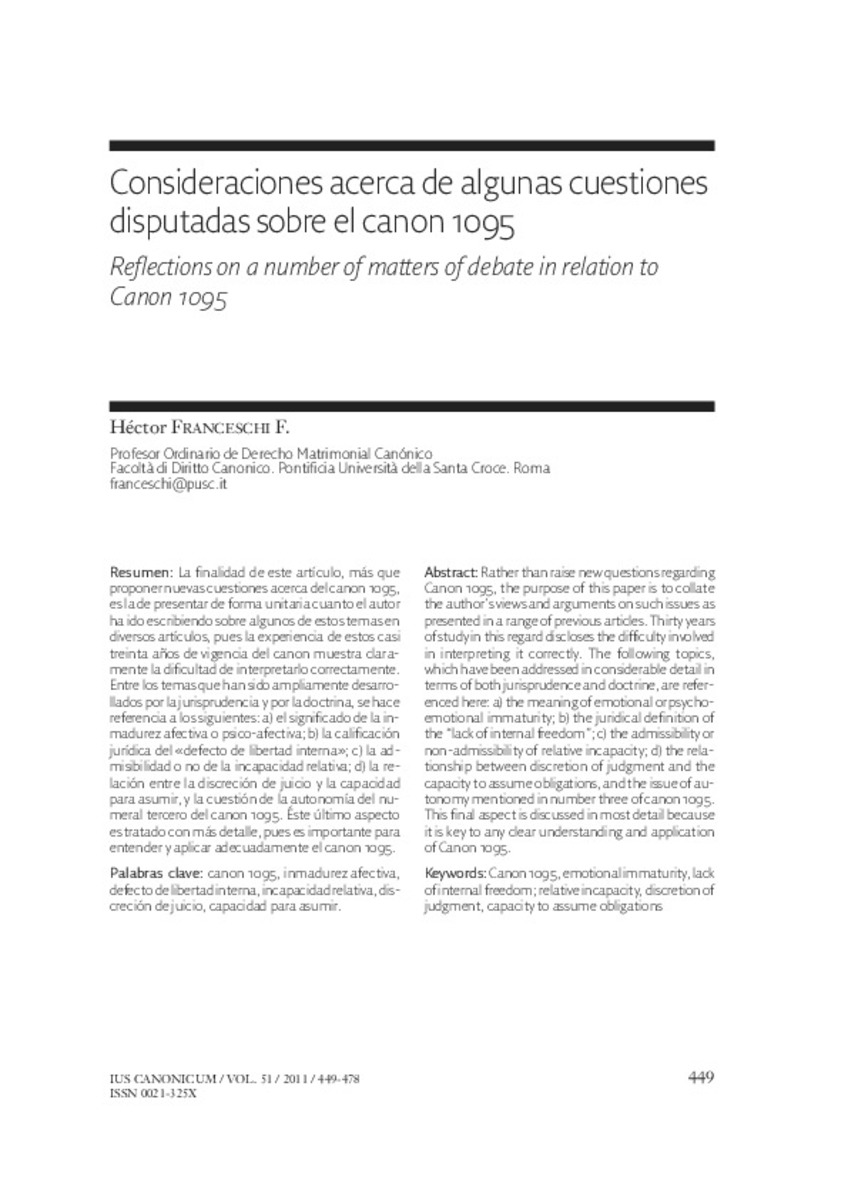Full metadata record
| DC Field | Value | Language |
|---|---|---|
| dc.creator | Franceschi, H. (Héctor) | - |
| dc.date.accessioned | 2014-11-26T15:25:07Z | - |
| dc.date.available | 2014-11-26T15:25:07Z | - |
| dc.date.issued | 2011 | - |
| dc.identifier.citation | IUS CANONICUM, 2011, 51, N. 102, págs. 449-478. | es_ES |
| dc.identifier.issn | 0021-325X | - |
| dc.identifier.uri | https://hdl.handle.net/10171/37109 | - |
| dc.description.abstract | La finalidad de este artículo, más que proponer nuevas cuestiones acerca del canon 1095, es la de presentar de forma unitaria cuanto el autor ha ido escribiendo sobre algunos de estos temas en diversos artículos, pues la experiencia de estos casi treinta años de vigencia del canon muestra claramente la dificultad de interpretarlo correctamente. Entre los temas que han sido ampliamente desarrollados por la jurisprudencia y por la doctrina, se hace referencia a los siguientes: a) el significado de la in- madurez afectiva o psico-afectiva; b) la calificación jurídica del «defecto de libertad interna»; c) la ad- misibilidad o no de la incapacidad relativa; d) la relación entre la discreción de juicio y la capacidad para asumir, y la cuestión de la autonomía del numeral tercero del canon 1095. Éste último aspecto es tratado con más detalle, pues es importante para entender y aplicar adecuadamente el canon 1095. | es_ES |
| dc.description.abstract | Rather than raise new questions regarding Canon 1095, the purpose of this paper is to collate the author’s views and arguments on such issues as presented in a range of previous articles. Thirty years of study in this regard discloses the difficulty involved in interpreting it correctly. The following topics, which have been addressed in considerable detail in terms of both jurisprudence and doctrine, are refer- enced here: a) the meaning of emotional or psychoemotional immaturity; b) the juridical definition of the “lack of internal freedom”; c) the admissibility or non-admissibility of relative incapacity; d) the rela- tionship between discretion of judgment and the capacity to assume obligations, and the issue of autonomy mentioned in number three of canon 1095. This final aspect is discussed in most detail because it is key to any clear understanding and application of Canon 1095. | es_ES |
| dc.language.iso | spa | es_ES |
| dc.publisher | Instituto Martín de Azpilcueta | es_ES |
| dc.rights | info:eu-repo/semantics/openAccess | es_ES |
| dc.subject | Canon 1095 | es_ES |
| dc.subject | Inmadurez afectiva | es_ES |
| dc.subject | Defecto de libertad interna | es_ES |
| dc.subject | Incapacidad relativa | es_ES |
| dc.subject | Discreción de juicio, | es_ES |
| dc.subject | Capacidad para asumir | es_ES |
| dc.subject | Emotional immaturity | es_ES |
| dc.subject | Lack of internal freedom | es_ES |
| dc.subject | Relative incapacity | es_ES |
| dc.subject | Discretion of judgment | es_ES |
| dc.subject | Capacity to assume obligations | es_ES |
| dc.subject | Materias Investigacion::Derecho canónico | es_ES |
| dc.title | Consideraciones acerca de algunas cuestiones disputadas sobre el canon 1095 | es_ES |
| dc.title.alternative | Reflections on a number of matters of debate in relation to Canon 1095 | es_ES |
| dc.type | info:eu-repo/semantics/article | es_ES |
| dc.identifier.doi | 10.15581/016.51.2569 | es_ES |
Files in This Item:
Statistics and impact
Items in Dadun are protected by copyright, with all rights reserved, unless otherwise indicated.






